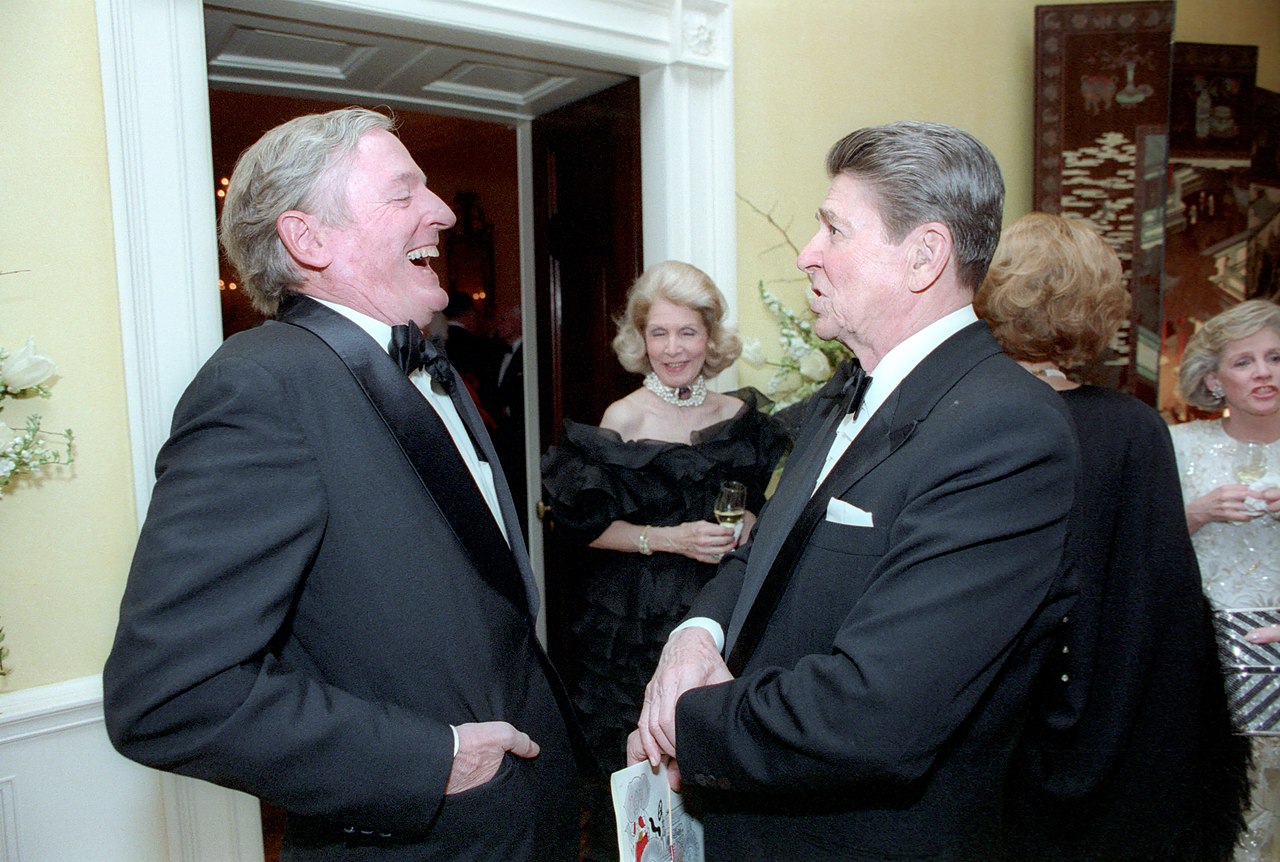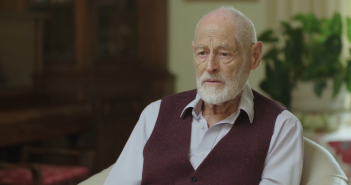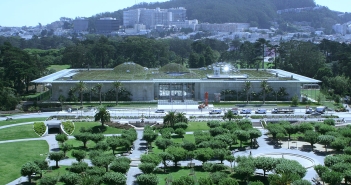Since the 1970s, the consistent presence of neoliberalism in politics alongside short, sharp bursts of neoconservatism have shaped our planet to a greater extent than any other ideologies. This has been to the detriment of all but a shrinking cast of billionaires that profit in periods of crisis, even during the pandemic. The prognosis is not good, even if the pandemic provides a porthole for the possibility of a realignment.
Distinct Ideologies
At one level, neoliberalism is extreme libertarianism, purged of its earlier socialist or anarchist underpinnings that were ultimately communitarian. Neoliberalism has had a tremendous influence on conservative thinking in recent times. Yet it is not conservatism in a traditional Burkean sense of conserving and preserving that which is good. Neoliberals do not advocate moderation, restraint, anti-extremism, perspective, nuance or that ill-defined word ‘balance,’ save in terms of conventional political rights such as liberty, privacy and freedom of movement.
Contemporary neoliberals are not supporters of little people, and in effect operate against the interests of the ordinary working person in the name of economies of scale or other workplace rationalisations. It is unbridled free market extremism, engendering a tragedy of the commons.
It did not begin this way. In its first iteration, the Austrian economist Friedrich Hayek warned against the excesses of socialism in The Road to Serfdom (1944). This was witnessed in Britain of the 1970’s with the three day working week, refuse on the streets, and the stranglehold of government by the unions. Many of Hayek’s points were valid, and I suspect he would be horrified at the political trajectory his ideas have taken. Similarly, Karly Marx was not responsible for and would have been horrified by Stalin.
The initial idea behind libertarianism was for a combination of unregulated laissez faire economics, and the legitimation of a hedonistic lifestyle through laws and social policies. I see nothing wrong with hedonism per se – or for tolerance of human frailties more generally – and indeed have spent much of my professional career as a barrister upholding the rights of an accused to due process.
Neoconservatism, on the other hand, is hardly even capitalist in outlook. It is really an offshoot of a more authoritarian leftism combined with a fundamentalist, morally self-righteous neocolonialism informed by ‘Christian’ values. It is associated in particular with the administrations of George W. Bush, with Paul Wolfowitz and Richard Perle its most prominent ideologues.
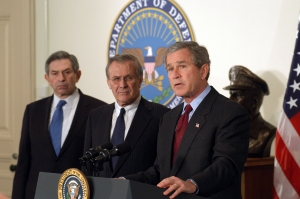
Left to right: Paul Wolfowitz, Donald Rumsfeld and George W. Bush.
Many neoconservatives made an ideological journey from the anti-Stalinist left to the camp of American conservatism during the 1960s and 1970s, with its intellectual roots in the magazine Commentary, edited by Norman Podhoretz. But anti-Stalinist does not imply a respect for human rights or the rule of law; its followers’ ambitions were simply global rather than limited to a particular country, as was the case with Stalin’s approach.
Neoconservatism adopts the unregulated free market, but not libertarian permissiveness or due process or a respect for international law: the ends would justify any means. That is what makes it distinctly evil. It attracted money from Christian fundamentalist and the rapture movement and cohabited with authoritarian academics.
Thus, there is a world of difference between former Supreme Court Justice Jonathan Sumption, a defender of human rights and free markets, and Tony Blair, the UK’s foremost neoconservatives. Blair is a fundamentalist Christian, a self-deluding mediocrity, who exported a destabilising jihadist war based on an absurd world view and sold it as a humanitarian intervention. He cannot really be described as a socialist – although state bureaucracies expanded massively under his New Labour – but nor is he a genuine conservative. He is simply a telegenic opportunist who became drunk on power.
His neocon influencers were Bush and Irish-American pseudo intellectuals like Daniel Moynihan, who fused Christian jihadism with racist fundamentalism and veneration of a deregulated market. The worst of all possible worlds.
Neoliberal Permissiveness
While neoliberals cock a snoop at Christian fundamentalism, some perhaps even going so far as to oppose the war in Iraq, an inbuilt resistance to state intervention means neoliberals such as even Barack Obama, did nothing to heal the wounds, or address the causes of discontent in the developing world.
I suspect the neoliberal endorsement of liberties and indulgence has in one sense been counterproductive. It may have not started with bad intentions. All were in favour of lifestyle ‘choices’: gay and transgender rights, sexual freedoms and shifting the agenda of equality towards formal equality rather than substantive equality. This involved superficial gestures such as including sufficient mixed race women in boardrooms but keeping the cleaners in the poverty trap.
The gender equity and transgender lobby now often act in a sinister way, and represent a branch of neoconservative in all its puritanical absurdity. ‘No platforming’ esteemed academics like Germaine Greer steers young people into sexual confusion and away from political engagement. It is a disaster emanating from a preening devotion to political correctness.
The sponsorship of the gender equity agenda by corporate America negates the real human rights agenda. These companies do not tend to fund advocates of social and economic justice, including rights to housing, healthcare and a clean, safe and aesthetically pleasing environment.
The privatisation of healthcare and even the Bismarckean welfare state began largely under Nixon in the U.S., where neoliberalism first evolved. It was replaced by an insistence that people exercise personal and professional responsibility, which masked a dismantling of social supports.
‘Even Richard Nixon’s Got Soul’ (but not William F. Buckley)
Nixon, a more sympathetic figure in hindsight – at least by comparison with latter day Republicans – was forced into healthcare privatisation by lobby groups from the medical profession, bringing into being the anti-health care system of America, where in 2018 over 17% of the country’s resources devoted to healthcare, yet it has one of the lowest life expectancies in the OECD. Moreover, industry sponsors regularly renege on private health care entitlements, through the machinations of unscrupulous lawyers. The fact of having a health care plan in the U.S. is no guarantee it will pay out.
Nixon had his doubts and did not buy into the ideology wholesale, but by the time of Ronald Reagan’s victory in 1980 the neoliberals were firmly in the ascendancy, with disastrous consequences for Americans, as Reagan’s advisor David Stockman describes in The Triumph of Politics: Why the Reagan Revolution Failed (1986).
A crucial neoliberal mastermind was William F. Buckley, the satanic ideologue of modern U.S. conservatism, who ostensibly venerated Edmund Burke, but subverted Burkean conservatism. Buckley helped establish the new philosophy of neoliberalism through texts such as God and Man in Yale (1953), and through his editorial of the Republican Party intellectual rag The National Review.
Buckley moved conservatism away from the spirit of Burke’s community of souls, towards naked self-interest. This has led to the undermining, and now the actual buying of the state apparatus by the corporatocracy. Thus, under Buckley’s stewardship conservatism mutated into a form of individualism tat undermined states.
Buckley’s brilliant rhetoric was only matched by his repulsive qualities as a human being. This is all-too-evident in the 2015 documentary Best of Enemies made about his media punditry alongside the almost equally contemptible Gore Vidal during the 1968 American election. Buckley had an enormous, understated, influence in moving the Republican Party, via Reagan, towards libertarianism, and the disaster capitalism now in vogue. Buckley in fact co-opted Russell Kirk, the Burkean conservative author of The Conservative Mind: From Burke to Eliot (1953) onto The National Review, seemingly in order to get him ‘on message.’
Yet the Republican Party and indeed much of the present Conservative party in the UK are not conservatives in the Burkean sense as aforementioned. They have become neoliberal fanatics, which is far from the origins of the paternalistic conservatism that emerged in Britain the late eighteenth century.
Why Edmund Burke Provides a Counterweight
Edmund Burke was a moderate conservative in the Benjamin Disraeli mould, who sought to preserve traditions he believed worth maintaining. His career was an idiosyncratic mixture of radicalism and abiding by conventions, and he believed in the desirability of change but not change for its own sake. Change should come about incrementally he believed, and with due regard to tradition; his antennae were attuned to unintended consequences.
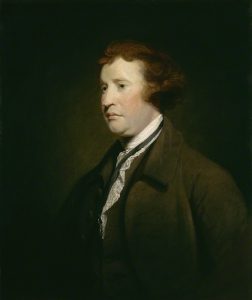
Edmund Burke.
Contemporary neoliberalism has engendered a form of corporate fascism that mandates extreme conformity in working days that stretch into long evening. I doubt Burke would endorse its excesses. He believed in a form of market capitalism favouring small enterprise, as do I too. Burke was also anti-monopolist and would see dominant multinational firms, and perhaps the European Union, as anathema to the capitalism he favoured.
Neoliberalism should not therefore be equated with traditional conservatism. Indeed if Edmund Burke was around today he might pen a text entitled: Reflections on Imminent Social and Economic Breakdown!
Burke of course, unlike adherents of neoliberalism believed in the concept of a community, involving associative obligations and reciprocal interactions. A moral and networked community in other words. The neoliberal mentality, on the other hand, leads towards social atomisation and fragmentation, or as Margaret Thatcher famously put it: “There is no such thing as society only individuals.”
Thatcherism is contrary to the Burkean ethos. I suspect that in modern times Burke would be regarded as a Keynesian capitalist, which is precisely what Buckley was attacking in God and Man in Yale. Burke ideas also align with environmentalists as he had a sense of community as inter-generational:
Society becomes a partnership not only between those who are living, but between those who are living, those who are dead, and those who are to be born.
He held a defined sense of the public good that was not just where the dice landed in the casino capitalism of the market. Further, though a passionate advocate of rights and liberties he was also a passionate advocate of restraint and moderation. He believed that the extension of rights should not extend to untrammelled liberties and licentious anarchy.
Although a conservative in terms of his invocation of habit, tradition and social order, and also with his belief in institutional contribution and preservation – as well as measures of fiscal rectitude – he was, conversely, also its opponent of in other respects.
One drawback to Burke as an intellectual, in my view, was his devotion to religion. Born in Ireland to a Protestant father and Catholic mother, noxious Irish Catholicism shaped him, diminishing his contribution; although one cannot say that he had the religious zealotry of a neoconservative.
The Beginning of the End of History
The Bushman-Blairite wars were an exercise in duplicity in shocking breach of international law. There were no smoking guns or development of nuclear weaponry in Iraq. It was Christian jihadism led by a latter-day Crusaders, including telegenic Tony that most lightweight of British gentlemen.
Neoconservatism is a nefarious dysfunctional ideology that suits the interests of the powerful, which tragically became the consensus. A Dictionary of Received Ideas. There would be no comeuppance for Tony or George Dubya, who now blithely paints portraits of migrants, with all irony seemingly lost on him.
In Britain, Brexit may lead to the gradual dismantling of the Blairite welfare state, even after the Johnson health care crisis, with the chronic under-resourcing and deregulation of the NHS now laid bare by the pandemic. This applies to all other countries, Italy most obviously, which diverted resources from essential services under neoliberal austerity measures. Meanwhile we see America on the brink of anarchy and civil insurrection due to the triumph of these ideas with the election of Donald Trump in 2016, who is the symptom of a very deep malaise.
The combination of neoconservatism and neoliberalism is a far more deadly virus than Covid-19, which has simply exposed the soft underbelly of societies afflicted by its ravages. From a neoliberal point of view healthcare or a clean environment are not rights but entitlements and part of a libertarian agenda.
The lack of regulation of spiraling accommodation and rental costs in the US and elsewhere brings a situation where, for the vast majority, outright ownership of property is a myth. Ostensibly, high salaries are hoovered up in hyper-inflated rents and mortgages subject to repossessions by vulture funds.
The cost of living is prohibitive, and cramped accommodation makes the possibility of a decent family life almost impossible for most, engendering a dysfunctional humanity. Inequalities, short term contracts, and punishingly long working hours destroy mental health, decrease productivity and render family life – save for a privileged few – a thing of the past. The long-term effects on children are potentially catastrophic.
This leads to short-termism and prevents even a modicum of forward planning for most people, who must live from one pay cheque to the next.
Lacking objectivity and perspective, as we struggle for survival in subhuman working conditions that undermine the quality of life, decline arrives in increments. This leads to petty corruption and greed, in a dog-eat-dog universe where the elderly are replaced once they have outlived their usefulness. Their fate is increasingly to be place in decidedly uncaring privatized nursing homes, or spend their last moments on a trolley in an underfunded hospital.
Nozick the Great Ideologue of Neo-Liberalism
Anarchy, State, Utopia (1974) by Robert Nozick was a subversive reaction to John Rawl’s A Theory of Justice who had promoted a theory of economic justice. It became a neoliberal bible. Nozick suggested that government intervention, meaning taxation, beyond the enforcement of contracts and the control of crime is akin to slavery or theft. I own my body, he argues, so I therefore own everything my body produces, and if the state takes that which I produce away from me it enslaves me or – more elegantly – ‘socialism forbids consenting acts between capitalist adults.’
The egregious fault with his argument is that it does not follow that because you own your body you own everything you produce. Inequalities are inbuilt into capitalism as David Ricardo’s Labour Theory of Value demonstrated. It also does not allow for any understanding of the human condition, other than one informed by radically disaggregated and individualistic behaviour, devoid of co-operation and community.
At the time many thought that him daft, and that his ideas could not be implemented as they would lead to a socially dislocated society. It was even suggested that Anarchy, State; Utopia was an elebatorate joke, or part of an intellectual game. Indeed, Nozick was fond of scholarly conceits and subsequently wrote a book with a radically different thesis. So perhaps he did not take what he said seriously. Others did unfortunately.
The consequences have been economic collapse and surging inequality, the gradual destruction of the middle class, and the privatisation and diminution in healthcare as a right, as well as homelessness and mass evictions
The University of Chicago with its two highly placed judges in Easterbrook (dangling for a Supreme Court judgeship) and the truly nefarious ‘most cited’ legal scholar in the world Richard Posner, have also been responsible for much of the damage.
Here we have the perfect reductio ad absurdum: all of human activity is reduced to the wealth maximisation thesis. Thus rape arises out of scarcity of resources: it is expensive for men to purchase sex so we should have a de-regulated prostitution market according to Posner; or adoption should be de-regulated to deal with a competitive baby market where the product can be purchased by the consumer. Such nonsense is reminiscent of Jonathan Swift’s Modest Proposal (1729) in which he satirizes an earlier version of neoliberalism, with the tongue-in-cheek suggestion that it would serve the polity to kill excess babies for economic gain.
The Middle Way
Keynes fell out of fashion because of the stranglehold of unionism and the imposition of socialist dogma in the 1970s. This created ‘a market’ for the work of the Chicago School and trickledown economics characterised by fetishist privatisation, deregulation and the elimination of state subsidies. In the late 1970s a retreat by the state made some sense, but the correction turned into an ongoing campaign. The market may have seemed like a score counter that could be tamed for human purposes. No longer. It is the recipe for inequality
Naomi Klein in her bestseller The Shock Doctrine (2007) analyses the growth and development of neoliberalism across the world. She dubs the economic paradigm ‘disaster capitalism’, homing in on how these crises and others are used to justify further disaster prescriptions. She quotes Hayek’s disciple Milton Friedman:
Only a crisis – actual or perceived – produces real change. When that crisis occurs, the actions that are taken depend on the ideas that are lying around. That, I believe, is our basic function: to develop alternatives to existing policies, to keep them alive and available until the politically impossible becomes politically inevitable.

Naomi Klein.
That is precisely where neoconservatism and neoliberalism coincide. Proto-neoconservatives remove the democratically elected Allende regime and replace him with Pinochet, before neo-liberal reforms open up the country for exploitation, washing their hands of any blood.
Yet all the best evidence indicates that stable growth occurs in Nordic and Middle European social democratic countries. There is a tangible link between Keynesian economics and sustainable redistributed growth. Neoliberalism does not generate sustainable growth, as opposed to wealth for the few, and does not provide for redistribution. In effect it is a recipe for diminished human welfare, less good for the greatest number.
Where Are We Now
The Nobel Prize winning economist Joseph Stieglitz famously described our present state of affairs as ‘Socialism for the rich capitalism for the poor’. And the new era of state and corporate feudal control and terror we have entered into will accentuate these trends. Thus during this pandemic some of the wealthiest individuals in the world have actually increased their wealth.
A return to the methodology of neoconservatism can be seen in the emergency legislation that has passed through the parliaments of U.K. and Ireland. In theory these are designed to confront an immediate emergency, but will become embedded, and spiral out of control just as we have with counter terrorism legislation. Enforcing self-isolation and ‘track and trace’ become new norms inflicted by neoconservatives and consented to by neoliberals, many of whom with notable exceptions such as Lord Sumption, forget their libertarian origins as long as the dosh keeps rolling in. Notably Tony Blair is awake to new opportunities.
Tony Blair: If you're not able to test significantly when trying to get large numbers of people back into a normal routine, you're going to be enormously inhibited in how you handle the disease.
Listen back to Tony on @BBCr4today (begins at 2:34:00): https://t.co/u4ZzL4NxcH
— Tony Blair Institute (@InstituteGC) August 17, 2020
The very phrase ‘social isolation’ is problematic and euphemistic – like ‘ethnic cleansing’ or ‘military intelligence,’ a contradiction in terms. In fact self-isolation suits a silo bubble of social atomisation and dealing with people or problems one by one by state authorities. We risk a descent into a new barbarism not least due to the pernicious effects of decades of privatization.
The Indian activist Arundhati Roy demonstrates how neoliberalism and environmental damage have gone hand-in-glove in her book Capitalism: a Ghost Story (Verso 2014). There are the mass evictions in India of ‘surplus population’ (a truly evil capitalism coining). The street vendors, rickshaw riders, the small shops and business people, and not least the suicide of 250,000 farmers.
This forced displacement, often from rural areas to cities, augments the channelling of wealth towards the one percent plutocracy controlling India.
It has been suggested by John Gray and Roy herself that the pandemic may lead to a rethink. I fear not. In fact, rather than becoming, as Roy puts it, a porthole to a sustainable and fair existence for all, I fear increased atomization, semi-permanent social distancing, diminishing social supports and the insidious undermining of civil liberties, supported by a scared and soma-induced population.
We are now entering an age of corporate feudalism and of mercantile state control with sub Malthusian ideas gaining traction. It is an age of extremism nourished by religious fundamentalism. It is a time for the convergence of Burkean conservatism with Habermasean moderate socialism to implement ideas informed by traditions of decency and the green agenda. It is a time for sustainable personal and societal living to be realised.

